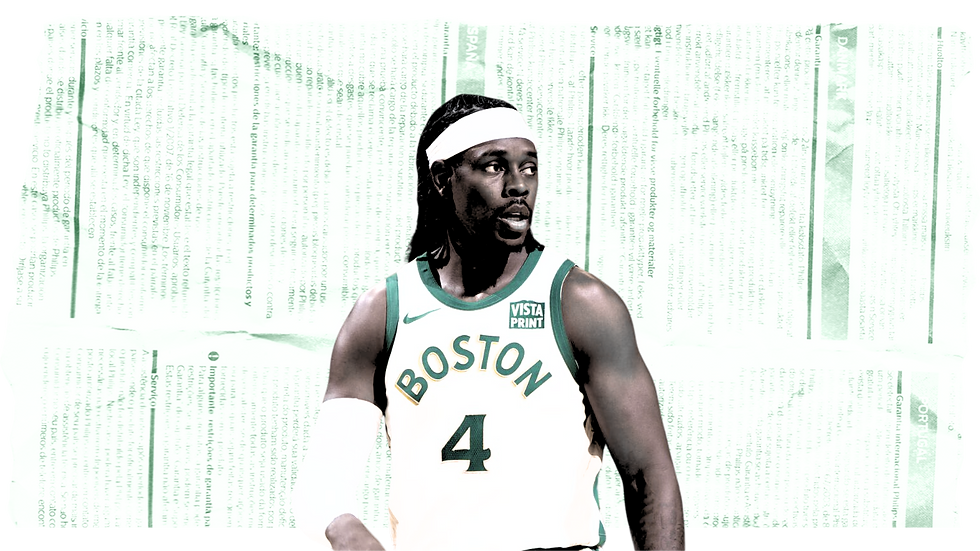Mazzulla, Celtics recapture defensive identity in Game 3 win vs Heat
- jboake20
- Apr 29, 2024
- 3 min read

Boston took their first punch of the postseason in Miami’s series-leveling Game 2 win on Wednesday. Shooting variance, schematic genius, and Miami’s patented playoff voodoo proved formidable counters to a historic talent discrepancy.
On Saturday night, seismic tactical shifts helped Boston restore order with a convincing 104-84 victory over the Heat in Game 3 at the Kaseya Center.
The Celtics’ defensive approach in Game 2 was out of character and, in retrospect, misguided. What started with surrendering semi-contested looks to rudimentary Miami shotmakers dissolved into a negation of Boston’s defensive strengths—a plausible strategy in theory, but ultimately, not in practice.
What Boston did was predicated on a season-long sample of three-point shooting from Miami’s supporting cast—now thrust into overstretched roles in the respective absences of Jimmy Butler and Terry Rozier. The Celtics were purposefully reactive off the ball, overshading into nearside driving gaps and collapsing on the mere threat of penetration. Statistically moderate floor-spacers were dared into face-up three-pointers over pseudo-contests from Celtic defenders.
But does molding defensive principles in accordance with inferior opposing personnel warrant bending the identity of a provenly dominant unit? On Wednesday, the answer was a resounding no.
As Boston’s gameplan became increasingly apparent, Miami caught an unprecedented rhythm from behind the arc—cashing in a franchise-playoff record 23 three-pointers at a 53.5% clip.
“They were making shots, guys that we want shooting the ball,” said Jaylen Brown. “Seemingly couldn’t get them to miss. Credit to those guys.”
As can be inferred from Brown’s postgame commentary, Boston fell victim to their own methodology. Sometime in the following days, there was an executive decision to tighten the screws and scrap the unsuccessful strategic endeavor.
Boston’s elevated intensity in Game 3 was tangible from the jump. An immediate 12-3 run in the opening frame set the tone for a night of suffocating defensive dominance.
“I think we put the emphasis on defense,” Brown said. “Trying to make them uncomfortable a little bit. They had a slow start, we had a good start on defense and I think that kind of opened up the game.”
Jrue Holiday, in particular, reestablished Boston’s disruptive presence at the point of attack. After struggling to consistently navigate high ball screens in Game 2, Holiday retained his Game 1 form—blowing up every Tyler Herro-centric action above the break. Holiday clung to Herro’s back pocket and effortlessly warped through ball screens as he cut the faucet on Miami’s primary outlet of offensive creation.
A stark contrast from the previous game: the Celtics extended their ball pressure above the break, incessantly creating discomfort for Miami on the perimeter. Watch Payton Pritchard strangulate Duncan Robinson's attempt at initiating offense:
In another wrinkle from Joe Mazzulla, Boston modified its pick n’ roll defense by bringing the screener’s defender up an extra step to funnel Herro into congested driving lanes. From there, Porzingis and Horford quickly retreated into a drop where they could smother shots at the rim.
Boston flipped the psychological edge from Game 2 by dispatching the Heat’s offensive rhythm. With Miami backpedaling, Boston’s intensity trickled into various facets of the game. The Celtics dominated the possession battle through their work on the glass and in forcing Heat turnovers.
As Boston continued to lean into its stifling defensive personnel, the Heat lacked the talent to counter. Even on a night where Miami actually outshot the Celtics from 3, Boston controlled the game through sweltering physicality.
Much is (rightfully) made of Miami’s outlandish postseason shotmaking upswing. Given the Celtics’ advantages on paper, mitigating the threat of unfavorable shooting variance is perhaps Boston’s best bet at quelling any Heat-engendered playoff demons.
Boston now faces the challenge of dialing up the intensity on a consistent basis—something they failed to achieve in the playoffs a year ago. Thwarting the success of Spoelstra’s adjustments in a pivotal Game 4 will be a telling test, especially after Mazzulla's failure to do so in Game 2. Time and again, the Heat have peaked in the face of adversity—expect Monday night’s contest to be no different.
%20(1600%20x%201500%20px)%20(17)_edit.png)



.png)
Comments